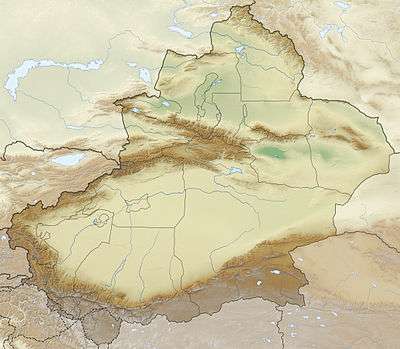Hejing County
Hejing County is located in the central-southern part of the Tian Shan mountains of Xinjiang, in the north-west of Bayingolin Mongol Autonomous Prefecture. The northernmost county-level division of Bayingolin, it borders Ürümqi City to the north, from which it is 190 km (120 mi) as the crow flies, and Korla City (the prefectural capital) to the south, which is 80 km (50 mi) away. It borders 15 cities and counties and is the most bordered county in the world.
Hejing County 和静县 | |
|---|---|
.png) Hejing County (red) within Bayingolin Prefecture (yellow) and Xinjiang | |
 Hejing Location of the seat in Xinjiang | |
| Coordinates: 42°18′59″N 86°22′58″E | |
| Country | People's Republic of China |
| Autonomous region | Xinjiang |
| Autonomous prefecture | Bayingolin |
| Time zone | UTC+8 (China Standard) |
| Hejing County | |||||||||||
|---|---|---|---|---|---|---|---|---|---|---|---|
| Chinese name | |||||||||||
| Simplified Chinese | 和静县 | ||||||||||
| Traditional Chinese | 和靜縣 | ||||||||||
| |||||||||||
| Mongolian name | |||||||||||
| Mongolian Cyrillic | Хэжин шянь | ||||||||||
| Mongolian script | ᠾᠧᠵᠢᠩ ᠰᠢᠶᠠᠨ | ||||||||||
| Uyghur name | |||||||||||
| Uyghur | خېجىڭ ناھىيىسى | ||||||||||
| |||||||||||
Demographics

The population of Hejing County is about 190,000 as of 2010, and the county is home to 29 different ethnic groups including Mongol, Han, Uyghur and Hui.
Economy
Agriculture dominates the county's economy. Paprika and tomatoes are grown in abundance, the crops nourished by waters from the melting of snow in local mountains.[1]
India-based spice company Synthite Industrial Chemicals established a processing facility in the county in 2012 with the support of the local government which cleared out of a 1,000 square foot office to provide office space and complementary electricity and communications for the company.[2] Synthite had decided to open its first overseas production facility after becoming frustrated with the low grade variety of paprika available in India despite attempts to encourage Indian farmers to grow higher quality crops.[1] The facility process 300,000 tons of paprika per year and employs 60 Chinese employees and three Indian employees. As of 2014 the company had expansion plans and intended to go into the cultivation of lavender and tomatoes, creating what it called a "major export hub".[1]
Transport
Hejing is served by the Southern Xinjiang Railway.
References
- Bansal, Rashmi (2014). Take Me Home. Westland Ltd. ISBN 9789383260805.
- "Spice Man". Outlook Business. July 20, 2013.
External links